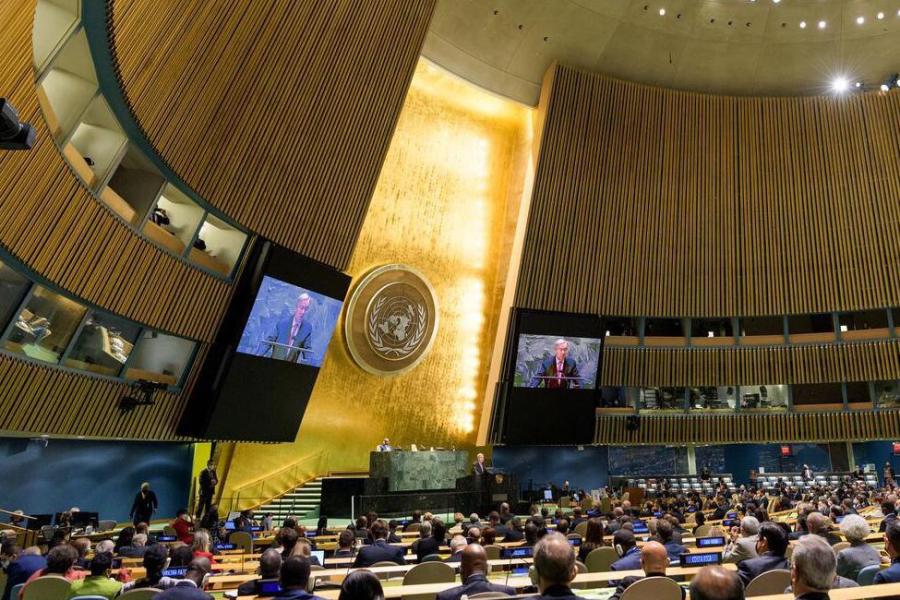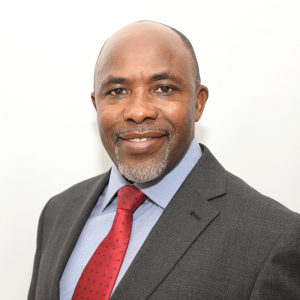The SDG Summit – Rallying to Re-ignite Ambition to Achieve the 2030 Agenda for Sustainable Development
Op-ed by the UN Resident Coordinator, George Wachira, ahead of the SDG Summit and UNGA78

Beginning this weekend and for most of the rest of September, all roads lead to New York for the 78th Session of the United Nations General Assembly (UNGA78), where His Majesty King Mswati III is expected to join other world leaders for this annual event.
UNGA78, however, is not the usual annual event. It comes at the halfway point of the implementation of 2030 Agenda of the Sustainable Development Goals (SDGs), the world’s 17-point plan to radically transform the world adopted by Member States at the same venue in 2015.
The test of any plan is the implementation. It has not been an easy path to achieving the SDGs, including its underlying architecture of the 5Ps – improving People’s lives, saving the Planet, building shared Prosperity, securing global Peace, and building collaborative Partnerships to achieve the goals.
The truth is that the world is not on track to achieving the goals. On Goal 5 on Gender Equality, for example, the UN Secretary-General had earlier warned that, at the current slow pace, it will take an estimated 300 years to end child marriage, 286 years to close gaps in legal protection and remove discriminatory laws, 140 years for women to be represented equally in positions of power and leadership in the workplace, and 47 years to achieve equal representation in national parliaments.
There are some acceptable reasons for the slow progress in the 2030 agenda. The obvious reasons have to do with the unprecedented global challenges in the last three years which have dealt a major blow to the implementation efforts of SDGs globally, including here in Eswatini. According to UN reports, climate change, conflict, COVID-19 and economic crises have pushed 165 million people into poverty since 2020. These shocks have contributed to rising inequalities and, sadly, put the rights of women and girls around the world under siege. The climate catastrophe is no longer a matter of speculation as we now regularly oscillate between the extremes of heat and fires and rains and floods.
Honesty is, however, called for: The UN Secretary General has asserted in the past that even without the current crises and disruptions, the world was not on track to achieve the SDGs. He had warned, on many occasions, that climate change was running faster than our plans to address it. The finances needed were unavailable or too costly for the countries needing them most. Spending priorities did not always target the most vulnerable or kindle growth. And with growing geopolitical tensions, it has become increasingly difficult to resolve conflict. Globally, people were already on the move looking for places of safety and protection, and inequalities within and between nations was on the rise. These challenges are within the grasp of human capabilities to resolve.
The SGD Summit – Rekindling the Hope
The UN Secretary-General has stated on many occasions, that, despite the challenges we face, this is not time to despair. There is just too much at stake, and we must keep the hope – and act!
A key component of UNGA78 is the SDG Summit taking place on 18-19 September. At this Summit, world leaders will review progress and generate new commitments and ambition to recover lost ground and accelerate sustainable development to achieve the headline targets of the 2030 Agenda to end poverty, reduce inequality and protect the environment.
The SDG Summit is an opportunity for Member States to collectively review progress and renew commitments and ambition to recover lost ground and accelerate sustainable development to achieve the headline targets of the 2030 Agenda to end poverty, reduce inequality and protect the environment.
To maximize the SDG Summit’s impact, the Secretary General dedicated 16-17 September the ‘SDG Action Weekend’ during which Member States, UN entities and stakeholders have convened inside the United Nations Headquarters to set out specific commitments and contributions to drive SDG transformation between now and 2030.
The SGD Action Weekend is a good opportunity for civil society, the private sector, youth, scientists, local and regional governments, and others to contribute to the success of the SDG Summit and the renewed momentum for the SDGs.
Eswatini’s Progress and Journey Ahead
I commend His Majesty’s Government and the people of Eswatini for the significant strides towards the achievement of the SDGs, despite the multiple crises. The SDG Summit comes soon after Eswatini presented its second Voluntary National Review of the SDGs in 2022. The report indicates that Eswatini had done exceptionally well in the health sector, especially in relation to HIV and AIDS, and in education. In 2020, Eswatini achieved and has surpassed the 95-95-95 Global HIV Target following a decline in the HIV incidence among adults aged 15 to 49 from 1.36% in 2016 to 0.85% in 2019. There was also improvement in waste management practices through various initiatives such as the establishment of waste control areas and “Phatsa Sakho Nawe Campaign” (carry your own shopping bag).
The country is also a champion in reducing malaria as incidence is now at 0.05 per 1000 population.
The report also noted that women’s representation in national parliament increased slightly from 18% in 2016 to 22% in 2018. While representation of women in Cabinet increased from 25 % to 30%.
Consolidating and improving on these gains is critical. In particular, Eswatini has the capacity to turn the tide on the pressing challenges of high levels of poverty (58.9% against 30% target by 2030); high unemployment rates at 33.3% (about 50% among young people) and under 5 stunting which has increased to 29.4%.
I therefore congratulate the Kingdom of Eswatini for taking time to prepare for the SDG Summit. Following consultations at regional and sector levels conducted by the Ministry of Economic Planning and Development, the Eswatini SDG Recovery and Acceleration Plan is expected to scale up transformative actions needed to respond to forge a strong path forward. I anticipate that the outcome of the SDG summit will complement all these efforts and enable Eswatini improve the lives of all Emaswati.
Quite commendably, the Government of Eswatini has prioritized responses to some of these challenges in the recently completed National Development Plan and in other national documents, including the Post-Covid 19 Recovery Plan.
Busy two Weeks in New York
It will be a busy two weeks in New York on the sidelines of UNGA78. Besides the SDG Summit, there will be the high-level Climate Ambition Summit intended to generate new, tangible and credible climate action to accelerate action at the mid-way point of the SDGs. The Climate Ambition Summit on 20 September comes soon after the Africa Climate Summit in Nairobi, Kenya, all in the build up to the 28th Conference of Parties on Climate Change (COP28) in the United Arab Emirates in November.
Also taking place on September 20 in New York will be the high-level Dialogue on Financing for Development. Advocating for an SDG Stimulus to provide immediate relief to countries in distress, reforming the international financial institutions, and ensuring that developing countries have a strong voice at the decision-making table are crucial to the collective achievement of the SDGs. For this reason, the African Union’s recent admission to the Group of 20 Countries provides a platform for the AU to strengthen its presence in the global arena.
Voice at the global level must, at the same time, meet with determined action at the domestic level. Thus, more effort will be needed in ensuring policy and institutional coherence especially those governing economic, trade and investment. It is increasingly recognised that sustainable development will depend on domestic resources. Aligning policies and strengthening institutions will be key to the mobilisation of domestic resources, increasing savings and priority spending, and encouraging investments to generate private finance at affordable rates.
As we await the outcomes of UNGA78 and the high-level meetings around it including the SDG Summit, I am convinced that fundamental shifts in commitment, solidarity, financing and action can put us back on track to end poverty, realize just societies and reset a balanced relationship with the Planet.
Back in Eswatini, the UN looks forward to working with the government on the country’s commitments and to supporting accelerated action towards the achievement of SDGs.
Speech by

















